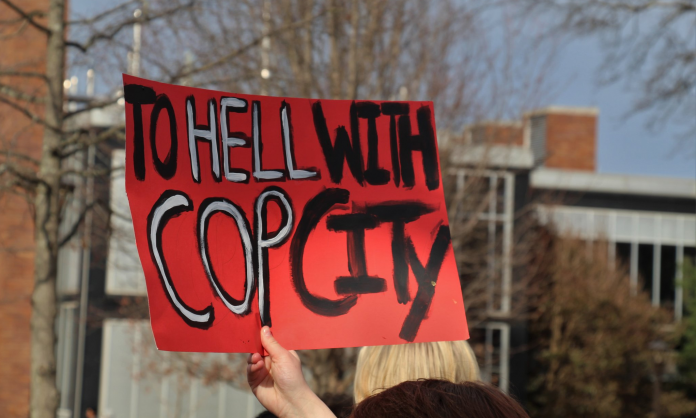The battle to stop the establishment of an elite police training hub in forest surrounding Atlanta, Georgia—dubbed Cop City by activists—has reached a fever pitch over the last weeks.
The US$90 million facility, approved by the Atlanta city council in September 2021, is to include a driving course, amphitheatre, stables and a mock city for practice police raids. It will occupy more than 34 hectares within the South River Forest, known to the indigenous Muscogee people as the Weelaunee Forest, at a site that was once a slave plantation and then a prison farm.
The forest is vital to the ecology and biodiversity of Atlanta, something once recognised by the city council. As late as 2017, its planning department designated the forest as one of the “city’s lungs” and described its tree canopy as a crucial buffer against climate change. Damaging this key part of the region’s ecology to make space for the police is a stark display of what matters to those in power.
The Atlanta Police Department is already one of the best resourced repressive forces in the US. It received one-third of Atlanta’s $700 million budget in 2022. On top of this grotesque public funding, the department obtains money and resources from the corporate-backed Atlanta Police Foundation, which is raising two-thirds of the budget for Cop City.
This foundation, the second largest of its kind in the US, is effectively a private slush fund that expands police powers without public scrutiny by providing contracts to and investments in companies developing advanced surveillance technology and weapons. As the corporate watchdog LittleSis explains, police foundations “act as a backchannel for corporate and wealthy interests [by] adding to already overinflated budgets without any required public oversight”.
According to the Private Equity Stakeholder Project, the Atlanta Police Foundation has transformed Atlanta into the most spied-on city in America. Through the Operation Shield project, it orchestrated the development of a network of more than 12,000 public and private surveillance cameras under the control of the police and furnished them with cutting-edge policing software that bears the Orwellian name of PredPol—predictive policing crime prevention software.
The Police Foundation intervenes in other ways. When Atlanta police shot and murdered a Black man, Rayshard Brooks, in June 2020, the foundation offered every cop in the city a $500 bonus, according to a report in the Guardian.
Cop City will increase the militarisation of the Atlanta police, to the immense benefit of the Atlanta ruling class and the immense detriment of workers and poor people. The online database Police Scorecard has revealed that more than 85 percent of those arrested by the city’s police are Black, despite Black people making up fewer than 50 percent of Atlanta’s population.
These are the bases on which the project has faced fierce opposition from Atlanta residents, who do not want native forest to be destroyed in exchange for the already over-resourced and trigger-happy police receiving additional resources, power and legitimacy.
Even before it received official endorsement, Cop City was rejected by a wellspring of community members and organisations. The sole public hearing held about the project in 2021 became a seventeen-hour-long denunciation from environmental advocacy groups, indigenous representatives and Black community organisations. This opposition has subsequently coalesced into a broad campaign that has organised recurrent protests, direct actions and community events designed to prevent its establishment.
Their rolling campaign hit international headlines in January, after Atlanta police murdered 26-year-old activist Manuel “Tortuguita” Paes Terán. An independent autopsy organised by Terán’s family (because the state authorities refused to release the findings of their official post-mortem) showed that he was shot at least fourteen times, in what has been labelled the first state-sanctioned killing of an environmental activist in the USA.
In response to this brutal murder, activists coordinated weeks of disruptive protest actions and community events, which authorities claimed as a further pretext to crack down on their campaign.
Earlier in March, 23 people were arrested and charged with domestic terrorism, a charge that carries a maximum prison sentence of 35 years under Georgian law and has an alarmingly wide scope, applying to anyone who harms “critical infrastructure, a state or a government facility” with the intent to “alter, change or coerce the policy of a government”.
The total number of people facing “domestic terrorism” charges over their activism to Cop City now stands at 40.
This crackdown is part of an international political development: climate activists are now at the front lines of the fight for civil liberties. Governments across the world are criminalising climate activism just as the scale of the environmental catastrophe is becoming clearer.
The fight to stop Cop City has brought environmental and social justice activists together, and shows the forces stacked against those who collectively fight for climate and racial justice.
In the face of this, left-wing individuals and organisations across the world should take heed of the defiant attitude embodied by Belkis Terán, mother of the murdered Cop City activist, whose grief has only emboldened her to fight. “I’m suffering”, she said, “but this suffering is giving to me power—power to fight, power to stand”.










